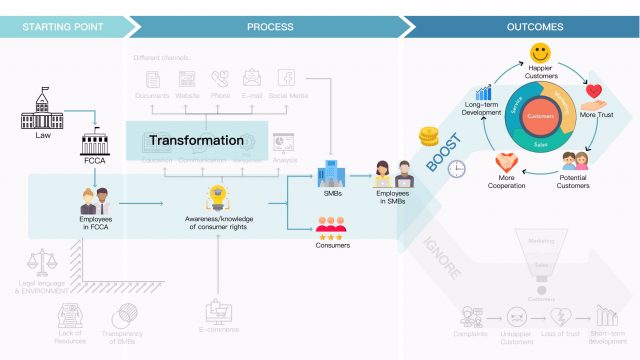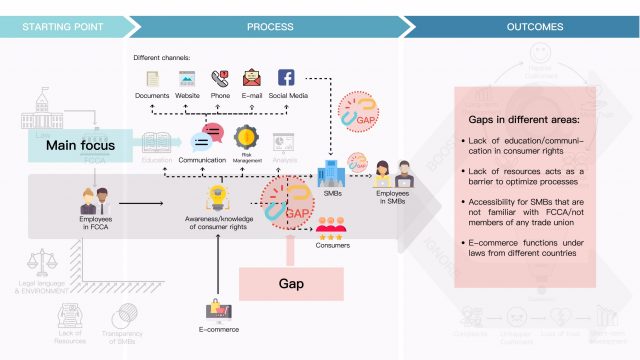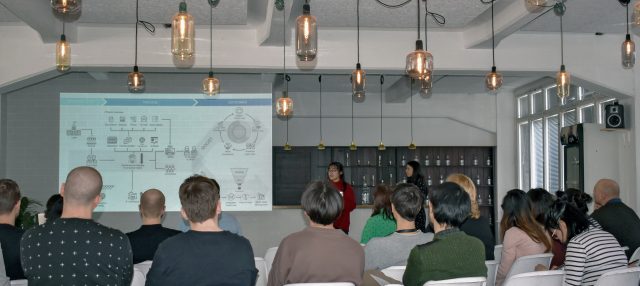This blog post reports on work-in-progress within the DfG course! The post is written by one of the two groups dealing with the Finnish Competition and Consumer Authority’s (running under the Ministry of Economic Affairs and Trade) brief on ‘Boosting Consumer Rights for Finnish SMBs’. The group includes Natalia Villaman, Yu Chen and LiangYan Shen, all designers from Creative Sustainability program, Aino Piirtola from Information and Service Management program, and Karin Fröhlich, a doctoral candidate in e-governance from Computer Science program.
Our mid-review presentation was held on April 2, at ELVA Loft on Meritullinkatu in Helsinki, Finland. It’s the sixth week of the DfG course, and a lot has already happened. We’ve lost ourselves in the internet while searching for additional content on consumer rights and their importance, we’ve held interviews and discussed with experts on why this project matters, to expand our perspectives and find clearer points to focus on. On the 2nd, we presented our current findings to our key stakeholders and had a chat on what we had come up with.

After hours of initial research, we found out that there are several interesting topics emerging from the consumer rights sphere. First of all, the overall knowledge on consumer rights, especially in the e-commerce space, has declined both on the businesses and consumers’ side. As a partial implication, the trust in businesses and markets has also started to diminish. At the same time, e-commerce is growing and more purchases are done online. Combined with the low level of knowledge, issues have started to occur, the most common ones including lacking contact information and clear reclamation channels, and appropriate redress mechanisms.

Based on the initial research, we came to the conclusion that we would like to focus on preventive work and risk management. We think that if information on the pros and cons of consumer rights compliance, especially in the e-commerce space, would be easily available, less issues would occur. Once we had presented our findings, we had the chance to sit down with the key stakeholders over a round-table discussion. In this discussion, they said that they were interested in our approach and happy about the improvements since the first workshop. They suggested to dig deeper on the predictive work by finding out how to implement consumer rights in the business model and figuring out how businesses perceive consumers.

Overall, the mid-review presentation went very well. We were able to validate our initial thoughts and got some good insight on how to proceed. We were given a bunch of potential interviewees from the businesses side to contact and advice on what to talk about with them. Our next steps will hence be to continue with the interviews and start formatting a solution for the problem that we have encountered. Back to work!
The DfG course runs for 14 weeks each spring – the 2019 course has now started and runs 26 Feb to 21 May. It’s an advanced studio course in which students work in multidisciplinary teams to address project briefs commissioned by governmental ministries in Finland. The course proceeds through the spring as a series of teaching blocks – Human perspective, Systems perspective and Intervention perspective – in which various research and design methods are applied to addressing the project briefs. Blog posts are written by student groups, in which they share news, experiences and insights from within the course activities and their project development. More information here about the DfG 2019 project briefs. Hold the date for the public finale 09:00-12:00 on Tuesday 21 May!
